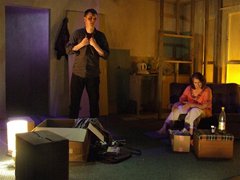First produced in 2000, Philip Ridley’s Vincent River is a stark reminder of the continued occurrences of hate crime and homophobic attacks in society. Drawing upon events of his youth and the murder of a friend in the 1980s, Ridley creates two characters trying to come to terms with a death which has resulted from homophobic violence: Anita (Eleanor Methven) – the mother of Vincent – and Davey (Kerr Logan) – the young man who found Vincent’s body – talk through and share their stories, each trying to piece together the narrative of Vincent’s life and death. But throughout the exchange, there are certain truths that neither wants to hear.
From the outset, the audience is thrown into the drama, as if watching a story that is already half played out, as Davey arrives on the doorstep of Anita’s grimey flat in a tower block in London’s East End. Stuart  Marshall’s set wonderfully creates a transitional space for the two characters. Having recently moved in, Anita’s half-opened boxes litter the floor of a drab and sparsely furnished flat, with the suggestion that it is only when the boxes are fully opened and the grim tales are told that the characters have a chance of moving on with their lives.
Marshall’s set wonderfully creates a transitional space for the two characters. Having recently moved in, Anita’s half-opened boxes litter the floor of a drab and sparsely furnished flat, with the suggestion that it is only when the boxes are fully opened and the grim tales are told that the characters have a chance of moving on with their lives.
Under Sophie Motley’s direction, the production gets off to a relatively shaky start as the exchange between Davey and Anita oscillates between sudden extremes of angry shouting and friendly banter. As the production progresses the pacing of the piece stabilises, the relationship between the two characters becomes more believable, and the stories they tell become utterly compelling. The narrations are beautifully enhanced by a combination of Sarah Jane Shiels’ lighting and Philip Stewart’s excellent sound design. A large frosted window at the side of the stage signals the street outside, and as the night draws in, the room is filled with an amber glow from the street lights. As the characters reach a climax in their storytelling, noise from the traffic gently and subtly punctuates their narratives.
Dressed in white trousers and a long bright pink top, Methven is good as the hardened yet heartbroken Anita who finds it difficult to come to terms with her son’s death, the community’s attitude toward homosexuality, and her own conflicting thoughts on the subject. However, it is the descriptions of the discrimination and bullying that she experienced while pregnant and unmarried which make up the most interesting aspect of her story, and it is easy to draw parallels between her own account of cultural intolerance and the fate of her son.
Methven’s performance is consistently strong and overshadows that of Logan. At the beginning of the production, he mumbles his lines and, although his nervous energy may seem appropriate for the character of Davey, his overly naturalistic performance makes it difficult to hear or understand what he is saying. However, during the second half of the production, his articulation improves greatly and he expertly brings Ridley’s text to life, completely drawing the audience into the world of his story.
While the relationship between the two characters may not be entirely believable at the beginning of the production, it is the approach to smoking on stage that continually disrupts the audience’s suspension of disbelief. The safety announcement before the performance alerts us to the fact that due to the smoking-ban in the workplace the actors cannot smoke on stage and it is hoped that this will not impact upon the “artistic integrity” of the production. Working within the legal restrictions, Davey and Anita merely pretend to light up and puff away on unlit cigarettes. However, despite the legitimate reasons for such an approach, it is still distracting for the audience that are watching a play that is otherwise performed as naturalistic.
Overall, the play has much to say about negative attitudes toward homosexuality and the consequences of both verbal and physical attacks. The programme notes give information and statistics regarding the regular occurrence of hate crimes and homophobia in Ireland, indicating the relevance of the play to contemporary culture. However, there are also some serious problems with the text itself, particularly in its use of homophobia – whether from Davey, Anita, or the wider community – to create a ‘realistic’ feel, as it relies on and perpetuates an idea that in the real world homosexuality is always met with some form of homophobia; it suggests that homophobic experience is something that is inevitable for gay people. The play lacks any sense of hope or empowerment, and although bringing a very important topic to the fore, the narrative feels repressive rather than liberating.
Pádraic Whyte is a Visiting Research Fellow at the Institute of Irish Studies, Queen’s University Belfast.